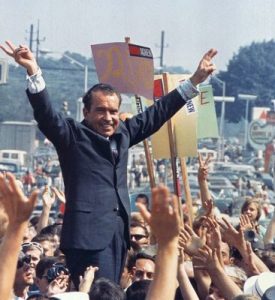The hoary myth of Richard Nixon’s “secret plan” to end the war in Vietnam has surfaced with some frequency in recent days as commentators across the political spectrum stretch for parallels between Republican presidential nominee Donald Trump and the campaign Nixon ran in 1968.
These commentators — writing for such diverse sources as the New York Post, the National Interest, the Daily Beast, History News Network, among others — have referred to Nixon’s “secret plan” as if such a pledge figured in his run for the White House 48 years ago.

What ‘secret plan’?
It didn’t.
Nixon never said he had a secret plan.
This is a media myth that won’t die, partly because “secret plan” seems so Nixonian in duplicity and deceit. It is, like many media myths, almost too good to be false.
So of late, we’ve had the New York Post declaring flatly that Nixon in 1968 “ran against the Vietnam War by claiming he had a ‘secret plan’ to end it.” We’ve had the National Interest — in a commentary headlined, “Can Trump Follow Nixon to Victory?” — asserting that “Nixon said he had a ‘secret plan’ to end” the war.
We’ve had a political columnist writing in the Lowell Sun in Massachusetts that Nixon “said he had a secret plan to end the war in Vietnam — a war that was tearing the country apart.”
“If I had any way to end the war,” Nixon was further quoted as saying, “I would pass it on to President [Lyndon] Johnson.” (Nixon’s remarks were made just days before Johnson announced he would not seek reelection.)
Now Nixon may or may not have had a “secret plan” in mind in 1968. But such a claim wasn’t a feature of his campaign. That becomes quite clear in reviewing the search results of a full-text database of leading U.S. newspapers in 1968, including the New York Times, Los Angeles Times, Baltimore Sun, Wall Street Journal, Washington Post, and Chicago Tribune.
The search terms “Nixon” and “secret plan” returned no articles during the period from January 1, 1967, to January 1, 1969, in which Nixon was quoted as saying he had a “secret plan” for Vietnam. (The search period included the months of Nixon’s presidential campaign and its aftermath.)
As I’ve noted several times at Media Myth Alert, if Nixon had campaigned in 1968 on a “secret plan” for Vietnam, the country’s leading newspapers certainly would have reported it.
The “secret plan” anecdote is likely derived from a speech Nixon made on March 5, 1968, in Hampton, New Hampshire, in which he declared that “new leadership” in Washington would “end the war” in Vietnam.
The wire service United Press International, in reporting on Nixon’s remarks, pointed out that the candidate “did not spell out how” he would “end the war.” The UPI account also noted that “Nixon’s promise recalled Dwight D. Eisenhower’s pledge in 1952, when Nixon was his running mate, to end the war in Korea.” Eisenhower was elected president that year.
A New York Times account of Nixon’s speech, published March 6, 1968, quoted the candidate as saying he “could promise ‘no push-button technique’ to end the war. Nixon also said he was not suggesting ‘withdrawal’ from Vietnam.” A brief follow-on report published in the Times that day quoted Nixon as saying he envisioned applying military pressure as well as diplomatic efforts in seeking to end the war.
A fine recent book about the tumultuous 1968 presidential election briefly takes up, and promptly dismisses, the “secret plan” claim.
The book, written by Michael A. Cohen and titled American Maelstrom: The 1968 Election and the Politics of Division, says:
“Though it is often claimed that Nixon spoke of a ‘secret plan’ to end the war, he never uttered those words. Even suggesting that he had a plan would have been too much for Nixon.”
More from Media Myth Alert:
- The campaign pledge Nixon never made
- Smug MSNBC guest invokes Nixon’s mythical ‘secret plan’ on Vietnam
- WSJ columnist, trying to explain Trump, trips over Cronkite-Johnson myth
- No, ‘Politico’ — Nixon never said he had a ‘secret plan’ for Vietnam
- WaPo, Helen Thomas, and Nixon’s ‘secret plan’
- Correction or clarification needed in WaPo reference to Nixon’s ‘secret plan’ on Vietnam
- Arrogance: WaPo won’t correct dubious claim about Nixon ‘secret plan’ for Vietnam
- WaPo, Bezos, and owning up to errors ‘quickly and completely’
- Nixon’s mythical ‘secret plan’ pledge for Vietnam invoked as taunt in Illinois politics
- Nixon’s secret plan invoked as putdown in Conn. gubernatorial race
- Recalling George Romney’s ‘brainwashing’ — and Gene McCarthy’s ‘light rinse’ retort
- Check out The 1995 Blog
- ‘Persuasive and entertaining’: WSJ reviews ‘Getting It Wrong’

